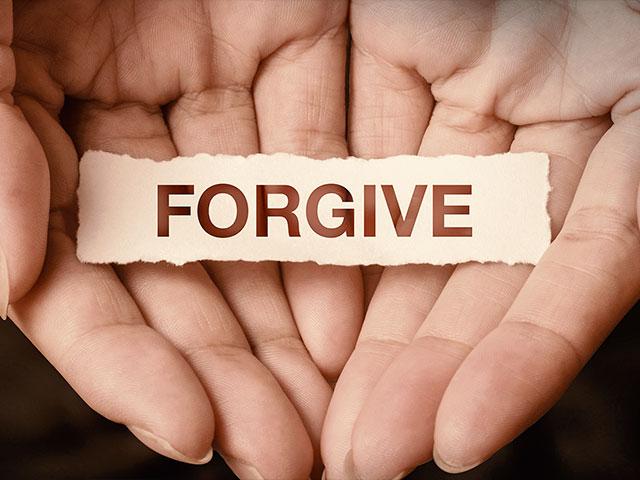Seven Steps to Forgiving and Healing
1. Admit that offenses have occurred in your life. Forgiveness is only appropriate when an offense has been committed and the offense has caused damage. When an offense has been committed against you, it is critical to recognize and admit the reality of the offense. Overcoming denial may be difficult, but it is essential. Forgiveness does not ignore the reality of an offense but, in fact, validates that the offense did indeed occur. Matthew 18:7; Proverbs 28:13; 1 John 1:8-9
2. Determine the damage caused by an offense. When an offense occurs it creates a spiritual debt. There is a spiritual value placed on the consequences resulting from the offense. God chose to use this financial idea to communicate His spiritual truth. The forgiveness parable of Matthew 18 shows that the value of indebtedness is determined by reconciling the account. There are offenses that have caused less injury. Greater offenses that create a greater debt need greater forgiveness. After the indebtedness has been determined the offense can be forgiven. Without understanding the damage caused by the offense it is not possible to forgive.
This parable is a financial illustration teaching the spiritual reality of forgiveness. Earlier in the chapter there is a serious warning not to offend children. Each particular offense by parents can have a different impact on their children. A rare angry outburst will have one kind of result. Continual name-calling and criticism will have a significantly different effect. The occurrence of incest has a dramatically different influence on a person's life. These various offenses will have a varying impact on a person's life. Forgiveness may be very challenging depending on the nature of the offense and it's impact on a person's life.
It is necessary to determine the value of the offense that needs to be forgiven. This may require some serious consideration. A severe offense can impact an entire life. The person may need to consider how the offense has or will impact them throughout his or her life. The impact from the offense will have to be considered for the past, present and the inevitable future. When the full impact is perceived, full pardon can be granted. Forgiveness should be viewed as a process. This is very accurate when new consequences from an offense are determined and the pardon is continually granted. Matthew 18:23, 24 and 26-28
3. Choosing to forgive. "Forgive" is a financial term that simply means to cancel the debt. The person recognizes the debt as such and makes the internal personal decision to release the offender from his indebtedness. Forgiveness is often misunderstood. It is significantly different and often confused with such things as ignoring the offense, trying to forget it and reconciliation of the relationship. Choosing to forgive is a personal, conscious and powerful choice of the will. Choosing to release the offender from his or her indebtedness is to be like the Lord Himself. Matthew 6:12; Matthew 18:21-35
4. Develop and live life with boundaries. A safe environment must be established to protect from future offenses. Some who have been violated in the past may lack the understanding of the importance of good boundaries. The holy life learns the difference between righteousness and unrighteousness. Perceiving healthy boundaries as well as having the will, strength and commitment to live them is essential. 1 Corinthians 3:16, 17; 1 Corinthians 6:20
5. Confronting the offense. The internal decision to forgive needs to be followed by the appropriate activity. The Scriptures direct us to confront the offense. Spiritual wellness is connected to our obedience to Scripture. The degree of spiritual wellness you experience is in direct proportion to the degree of confrontation. As the seasons progress, healing occurs, strength grows and courage appears. The ability and desire to confront the offense arrives.
The extent of the confrontation will depend on the circumstances. The confrontation will begin with the internal acknowledgement of the offense and the damage caused. Ideally, it is best if the offender can be confronted directly and the issue resolved. Realistically, this does not always happen. At times the injured person does not have the ability or opportunity to go to the offender directly and address the problem. Overcoming the fear associated with the person and or the offense has crippled some from confronting the situation. Sharing the problem with good confidants and gaining support helps tremendously. Some choose to receive counseling, journal, and rehearse before going to the perpetrator. Some bring their support person with them. Finding the right opportunity and method may be very difficult. This may be the toughest season of the journey. One thing is for sure - the degree of healing and strength is directly proportional to the degree of confrontation.
Matthew 5:24; Matthew 18:15
6. Live the holy life. Establish and maintain a growing committed life. As you walk in Christ you will experience the healing and sanctifying work of God. By sowing righteous seeds of obedience you will reap the desired harvest. Walking by faith rather than by sight and trusting in the Lord for His blessing produces the abundant life you desire. Leviticus 11:44; 1 Peter 1:16
7. Clear our own offenses. It has been said that hurt people hurt people. This ongoing season should keep us looking at our own life. We need to recognize when we hurt others and be ready to seek forgiveness from them. As we grow in Christ, we will be able to seek forgiveness for our offenses from those who offend us even before we confront them for their offenses against us. Matthew 5:24
Excerpted from the book "Help for the Hurting Heart" by Steven R. Silverstein. Used by permission of New Life Ministries. New Life Ministries has a variety of resources on men, women, and relationships. Call 1-800-NEW-LIFE or visitwww.newlife.com.






